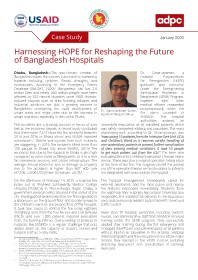- About Us
-
Who we are
-
- Publications
-
- ADPC Academy
-
MediaADPC'S NEWS
New tools to manage public health issues in complex emergencies New tools to manage public health issues in complex emergencies
28 Oct - 9 Nov 2013
Bangkok, Thailand
A two-week intensive course on critical public health issues faced by personnel working in complex emergencies will take place in Bangkok this October. The course aims to enhance the capacity of humanitarian assistance workers and their organizations to respond to the health needs of refugees and internally displaced persons affected by complex emergencies.
The course, Public Health in Complex Emergencies (PHCE), is in its 11th consecutive run, and will be arranged by Asian Disaster Preparedness Center (ADPC) on 28 October - 9 November 2013 in Bangkok, Thailand. The training is aimed especially for staff of non-governmental organizations (NGOs) and private voluntary organizations (PVOs) who are – or in the near future might be – responsible for making decisions that affect the health of refugees and internally displaced persons.
Besides the staff of NGO’s and PVO’s, the course is also recommended for district medical officers and other staff from the Ministry of Health working in regions affected by complex emergencies; staff from UN agencies, international and governmental organizations that are instrumental in planning services for people affected by complex emergencies; as well as medical coordinators, health coordinators, program managers, and district medical officers from international and national health organizations.
“The curriculum has been developed by field staff from humanitarian, international, and academic organizations. In this way we can make sure that the course specifically meets the needs of the participants working in complex emergencies”, says Ms. Janette Lauza-Ugsang, Senior Project Manager at ADPC.
Applying knowledge to practice
Medical Director, Dr. Waleed Ikram from the International Medical Corps in Damascus, Syria, attended the PHCE course in 2012. Since the beginning of the Syrian crisis the same year, Dr. Ikram has been responsible for restructuring his organization’s health and mental health programs to create an emergency response for the crisis.
“The course helped me in developing and designing a multi-sectoral emergency program, and implementing the program in a successful manner. It also helped me in refreshing my knowledge of emergency programs and the minimal standards to be achieved in any emergency. I passed this knowledge on to my Syrian colleagues through weekly discussions”, Dr. Ikram says.
“The course presented how various emergency programs and activities can be interlinked and adapted to various contexts. It helped me improve having a holistic vision and an integrated services approach”, he adds.
National Coordinator Dr. H.D.B. Herath from the Ministry of Health in Sri Lanka also attended the course in 2012. He has used the new skills in conducting a training program on health sector disaster management for medical officers.
“It was useful to learn about the international laws and standards of public health response. I’ve used the new skills also in drafting standard operating procedures for health sector disaster management”, Dr. Herath says.
Sharing experiences from the field
The trainers of the PHCE course are leading international and regional experts with a wide variety of field experience in complex emergencies. They come from a range of backgrounds from NGO’s to multi-lateral organizations, international agencies, and academic and research centers.
“The experience of the resource persons and facilitators makes the sessions very interesting. I was also happy that despite the tight schedule, the course program was tailored according to the participants’ feedback and special interests”, says another PHCE course alumna, medical training team leader Dr. Tharaphi Aung from International Rescue Committee (IRC) in Thailand.
Organized by ADPC, the course is part of Public Health in Complex Emergencies training program implemented in cooperation with Faculty of Health Sciences, American University of Beirut in Lebanon; and School of Public Health, Makerere University in Uganda. The course is supported by World Education, Inc. (WEI) and International Rescue Committee (IRC).
Related PublicationsLatest NewsRelated Trainings
-


